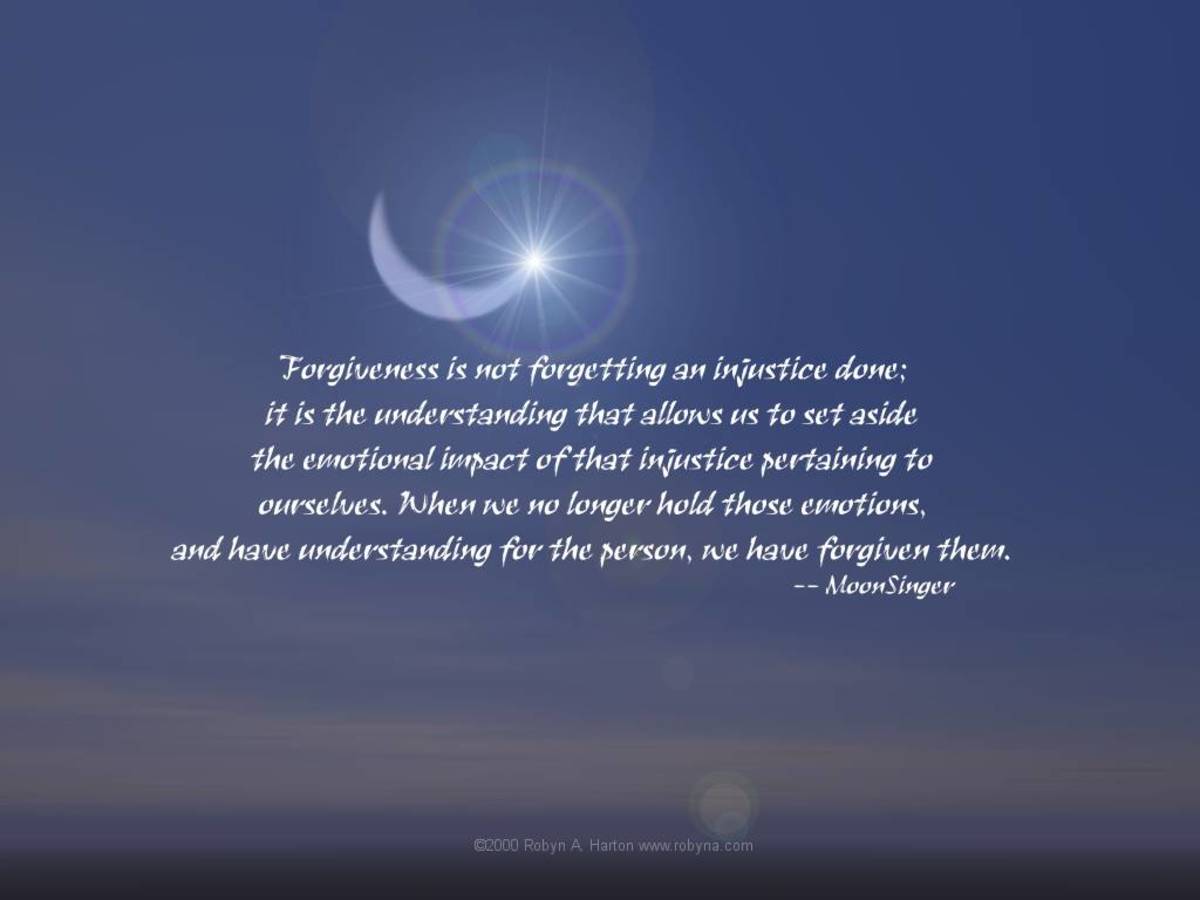The Amazing "Lightness" of True Forgiveness

“. . . For they shall all know me, from the least of them unto the greatest of them, saith the LORD: for I will forgive their iniquity, and I will remember their sin no more.” (Jeremiah 31:34)
The Bible teaches us that forgiveness is an act of pardon; it is a gift of love. Because God loves us, He grants forgiveness to us for our sins, and because we can be forgiven, He wants us to also forgive others. That means forgiveness is something you are free to give—to someone else, or to yourself. And it is only through forgiveness that there is a way to loose the bonds of transgressions, because it frees us from the soul-crushing weight of negative emotions such as guilt, shame, bitterness, anger, and blame. Because of forgiveness, an incredible lightness can always be part of the miracle of being.

Unforgiveness: The Weight of Holding On
It can be hard to let go of anger, resentment, and/or bitterness when someone, in the past, caused you to feel hurt or pain. It can also be hard to let go of the guilt and/or shame that is often left behind from the pain or hurt you’ve caused others. But there is a way to let go, and this way—to lighten the weight of anger, resentment, bitterness, guilt, shame, and blame—is through forgiveness. Why? Because forgiveness frees. It frees us from the need to blame, to feel guilt, shame, anger, bitterness, or resentment.
The Bible teaches that when God forgives, He remembers our sins no more. What was described as forgiveness in Jeremiah 31:34 (above), says to me that after forgiveness is granted, the slate is wiped clean for the forgiven. That means the owner of forgiveness is free to release resentment and blame, and to go on with life while experiencing the pure, unadulterated joy of innocence, and incredible lightness. The blessed feeling of being unburdened brings new opportunity; it ushers in a new start, a brand new chance to be the person you really want to be.
The Soul-Freeing Benefits of Forgiveness
God promises us great benefits from forgiveness. According to Psalms 32:1- 5, forgiveness leads to personal happiness and spiritual freedom. This Scripture teaches:
“Blessed is he whose transgression is forgiven, whose sin is covered. Blessed is the man unto whom the LORD imputeth not iniquity, and in whose spirit there is no guile. When I kept silence, my bones waxed old through my roaring all the day long. For day and night thy hand was heavy upon me: my moisture is turned into the drought of summer. I acknowledged my sin unto thee, and mine iniquity have I not hid. I said, I will confess my transgressions unto the LORD; and thou forgavest the iniquity of my sin.”
This passage describes the heaviness of guilt. Can't you see it? The tired, strained body worn out from the crushing weight of transgressions; a mouth that’s parched dry—deprived of hydration from the enervating drain of being shackled to negativity. Thankfully, God offers a way to break free from the heaviness, to run to and to embrace freedom, through forgiveness. And all we have to do to receive it, is to ask.
Once we’re forgiven, God grants us a new life free from the shackles of transgressions, because He no longer remembers them. In Isaiah 43:25, it is written:
“I, even I, am he that blotteth out thy transgressions for mine own sake, and will not remember thy sins.”
But that’s not all. God doesn’t just forget our sins, holding them against us no more, according to Psalms 103:12, He also removes them from us:
“As far as the east is from the west, so far hath he removed our transgressions from us.”
God forgets our sins, and when we receive the forgiveness He grants us, He enables us to put them away, to never bring them again to the forefront of our lives. Doing this is what lightens our burdens so that we can move forward with life, unencumbered by any remnants of guilt, shame, anger, bitterness, resentment, or blame once associated with past transgressions.

Letting Go: The Freedom of Forgiveness
We all need the amazing, super liberating power that only forgiveness can provide. I look at forgiveness as possessing at least four freeing statements, which I see as being attached to each and every transgression/wrong that is forgiven. For each one, forgiveness says:
- “I am releasing you from owing me, for the wrong you committed against me.”
- “I am releasing me from anger and bitterness I once held against you, for the wrong you committed against me.”
- “You are releasing me from anger and bitterness I once held against you, for the wrong you committed against me.”
- “You are releasing yourself from any negative emotions associated with the wrong you committed against me.”
The Bible teaches us a lot about the nature of forgiveness in Matthew 6:12-15. This is the passage that describes forgiveness as including “our debts,” as well as “our debtors.” A debt, as the word is used here, refers to anything we owe, and anything that is owed to us. I believe the concept of debt goes beyond money and finance. You can owe someone a debt of gratitude, which you have failed to give. You can owe a debt of kindness that you have withheld from someone for some reason. You can owe a debt of loyalty, a debt of trust, or a debt of the promise of assistance. And for every debt that you owe, there could also be a debt that is owed to you. Enter forgiveness; a love offering. Once granted and received, forgiveness voids out guilt or shame or any negative emotion stemming from any debts you’ve collected or that you owe, and it frees you from the bonds of any negativity associated with them.
The Scripture from Matthew goes on to say, “For if ye forgive men their trespasses, your heavenly Father will also forgive you: But if ye forgive not men their trespasses, neither will your Father forgive your trespasses.”
Therefore, it is not simply a good idea to forgive; it is a requirement that Christians forgive based on faith, to be obedient to God. If you want/expect God to forgive you and not hold your sins against you—so that you can experience the incredible lightness of being unburdened by them—then you must be willing to give the same gift of freedom to others.
If you enjoyed this article, you might also want to read, by this same author:
© 2012 Sallie B Middlebrook PhD








